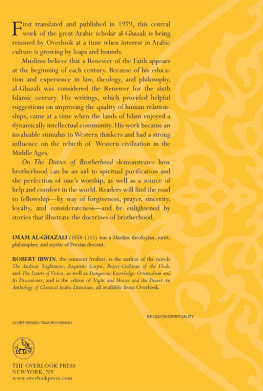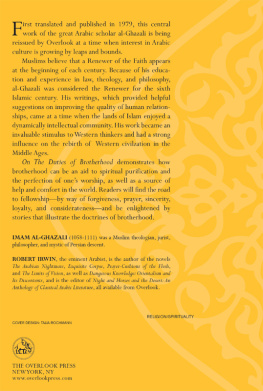
This edition first published in the United States in 2016 by The Overlook Press, Peter Mayer Publishers, Inc.
141 Wooster Street
New York, NY 10012
www.overlookpress.com
For bulk and special sales, please contact , or write us at the above address.
Copyright 1976 translation by Muhtar Holland Foreword 2016 by Robert Irwin
All rights reserved. No part of this publication may be reproduced or transmitted in any form or by any means, electronic or mechanical, including photocopy, recording, or any information storage and retrieval system now known or to be invented, without permission in writing from the publisher, except by a reviewer who wishes to quote brief passages in connection with a review written for inclusion in a magazine, newspaper, or broadcast.
Cataloging-in-Publication Data is available from the Library of Congress
Manufactured in the United States of America
ISBN: 978-1-4683-1355-0
1 3 5 7 9 10 8 6 4 2
to my spiritual brothers and sisters
Contents
Foreword
Robert Irwin
Abu Hamid Muhammad ibn Muhammad al-Ghazali (1058-1111) is one of the greatest intellectuals in Muslim history. He was born in Tus in eastern Iran and, having studied both Sufism and religious sciences, he became a leading alim (a religious scholar, plural ulama ). In 1091 Nizam al-Mulk, the vizier of the Seljuk sultan, appointed him chief professor at the Nizamiyya madrasa in Baghdad. (A madrasa is a college where the religious sciences are taught, including the Quran and its interpretation; sayings of the Prophet and his Companions; theology; and the Sharia, or religious law.) In this early phase of his life al-Ghazali, who had powerful patrons, was politically active. But in 1095, at the age of thirty-eight, having experienced a religious crisis, he resigned his post and went away to seclude himself in Jerusalem and later Damascus. In 1105 he returned to teaching, this time at the Nizamiyya madrasa in Nishapur in northeastern Iran. He spent his final years in a khanqa (a Sufi centre) in Tus.
He wrote copiously and his writings were immensely influential. The major works include The Incoherence of the Philosophers , a religiously inspired attack on philosophical rationalism and The Deliverance from Error , an account of his intellectual breakdown and how Sufi mysticism rescued him from doubt, as well as led him to reconcile Sufism with mainstream Sunni Islam. But The Revival of the Religious Sciences (in Arabic Ihya Ulum al-Din ) is far away his most influential work and it is also much the longest. He started writing this book while in retreat in Jerusalem and it took approximately ten years to complete.
The Revival of the Religious Sciences was conceived of by its author as constituting the science of the hereafterthat is to say, a complete guide to salvation. It is in four parts and each part contains ten chapters. Part one deals with acts of worship; part two with social customs; part three with vices or faults leading to damnation; and part four with virtues leading to salvation. On the Duties of Brotherhood is one of the chapters making up part two. Such mundane topics as marriage, eating, traveling and earning a livelihood also feature in part two, as al-Ghazali demonstrated that there was a right religious way in proceeding in such matters and a wrong one. The book as a whole was modeled an earlier and shorter Sufi guide to ethical living, the Qut al-Qulub (The Nourishment of Hearts) by Abu Talib al-Makki (d. 996).
The Revival of the Religious Sciences was composed in response to what al-Ghazali perceived as the succession of multiple crises that had overtaken the Muslim world in his lifetime. In 1092 his patron Nizam al-Mulk was murdered by an Ismaili assassin. That same year the Seljuk sultan whom Nizam al-Mulk had served, Malik Shah, died, perhaps poisoned. Thereafter the diarchy of an Abbasid caliph in Baghdad, who presided as the spiritual head of the Sunni Muslim community but under the politico-military protection of the Turkish Seljuk sultan, began to fall apart, as rival Seljuk claimants contended for the sultanate. Almost everywhere the Sunni Muslim community was under threat from Ismaili Shiism. Egypt was under the control of an Ismaili Fatimid caliph. In 1090 Hasan al-Sabah, the leader of the Ismaili Assassin sect, had seized the fortress of Alamut in northwest Iran and made it his headquarters. That same year another heretical group, the Carmathians, sacked Basra. In 1098 the armies of the First Crusade entered Syria and they would go on to capture Jerusalem in 1099.
Ismailism posed an intellectual challenge to Sunnism, as did the teachings of certain philosophers. There were also a few wild Sufis who had strayed into heresy. But al-Ghazalis chief target in The Revival of the Religious Sciences was actually other ulama and he repeatedly denounced the hypocrisy, greed, quarrelsomeness, laxity and fixation on trivia of religious scholars. The Revival of the Religious Sciences is not a humdrum ethical treatise. Rather al-Ghazali designed this extraordinarily lengthy text as a document that would establish his credentials as a mujaddid , or renewer of Islam. He saw it as his mission to lead singlehandedly the Muslim world out of the slough of doubt and error and to restore the virtuous Islamic society that had existed under the Prophet Muhammad and the first four caliphs (who were known as the Rashidun , the rightly guided). According to popular Muslim tradition a mujaddid appears at the turn of every Muslim century.
In On the Duties of Brotherhood al-Ghazali drew successively on the Quran, the sayings of the Prophet, the sayings of the Companions, religious scholars, Sufis, poets and transmitters of folklore. He often added his own commentary to this corpus of exhortations, maxims, parables and past examples of both good and bad behavior in the way of brotherhood. There is nothing easy-come, easy-go in al-Ghazalis concept of this relationship. This is not an egotistical manual on the lines of How to Win Friends and Influence People . It is not a matter of forming advantageous alliances or casual acquaintanceships, but rather something that is formally entered into. One chooses ones brother and, having done so, one enters into a contract with him that entails both rights and duties. One should be prepared to sacrifice ones property and perhaps even ones life for ones brother. His well-being should come before your own. The key hadith (saying of the Prophet) is The believer loves for his brother what he loves for himself. Al-Ghazalis ethic is a demanding one. Believing brothers should strive to achieve the degree of cohesion and cooperation shown by Muslims in the first century of Islam. At the individual level one must learn how to live a better life in this world, in order to prepare for the life that is to come after death. This world is the sowing ground of the hereafter. His guide to right living is challenging and in some respects rather stern. For example, he warns the believer against jokes and fidgeting. Since he had lost faith with political solutions, he advised believers to shun the company of rulers.
As Michael Cook has observed in Commanding Right and Forbidding Wrong in Islamic Thought (2010), We might be tempted to see Sufism as a kind of alternative Islam, were it not that in many historical contexts it simply was Islam. In al-Ghazalis lifetime Sufism was so pervasive that it came close to becoming the Sunni orthodoxy. But, while The Revival of the Religious Sciences relays many Sufi maxims and is suffused with Sufi sentiment, it is not actually a mystical treatise. It is rather a work on ethics and conduct and it places great stress on the externals of religious practice.












